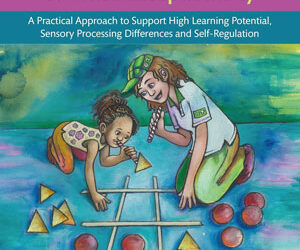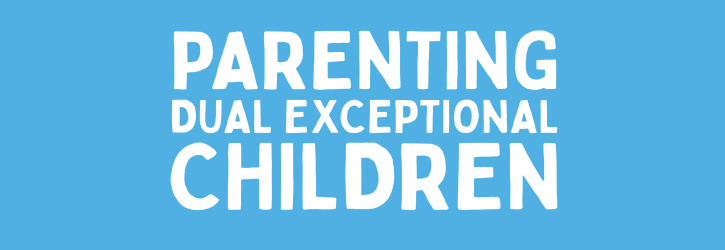
Resources for Parents
and Carers
A child experiences dual or multiple exceptionality (DME) when they have both high learning potential (otherwise referred to as being “gifted”, “gifted and talented”, “exceptional”, “more able” and “most able”) alongside a special educational need because of a learning difficulty or disability. This section provides resources to help parents and carers to support their children with DME.
Publication
Parenting Dual Exceptional Children
Denise Yates
Published 2022 (Jessica Kingsley Publishers)
This book is a comprehensive, practical guide to Dual or Multiple Exceptionality (DME). It offers a strengths-based approach towards helping parents to recognise and focus on their child’s areas of potential, support them towards better attainment and self-esteem and to build on their abilities whilst also identifying and addressing areas of difficulty. It provides an understanding of the mixed learning profile of children with DME, as well as guidance for parents on working positively with schools and providing their child with the support they need.

Advice Sheet
F01 Dual or Multiple Exceptionality (DME)
In the UK, the term Dual or Multiple Exceptionality (DME) is used to describe those who have one or more special educational need or disability, combined with a high ability (which Potential Plus UK calls high learning potential ). This free fact sheet from Potential Plus UK informs, supports and advises teachers, professionals and parents/carers of children with DME. Issues relating to educating, parenting and supporting a child with DME are covered in this fact sheet.

Advice Sheet
F02 Autism and High Learning Potential
Children on the autism spectrum who also have high ability are considered “dual or multiple exceptional” (DME). This free fact sheet, from Potential Plus UK, offers clear information on how autism may affect children with high learning potential. It provides information on the characteristic traits that children who are autistic with high learning potential share, problems which may arise at home or at school and useful strategies and ideas to help deal with those issues.

Advice Sheet
F07 Obsessive-Compulsive Disorder and High Learning Potential
Obsessive-Compulsive Disorder (OCD) is an anxiety-related disorder. This is characterised by disturbing thoughts that can lead to compulsive or ritualistic behaviour. Such behaviour is carried out to prevent or disarm these thoughts.
This free fact sheet, from Potential Plus UK, considers what OCD is, how it relates to high learning potential, how to treat OCD, parenting a child with both high learning potential and OCD, and supporting OCD children in the classroom.

Advice Sheet
F05 Sensory Processing Difficulties and High Learning Potential
Sensory processing difficulties is an umbrella term for a variety of neurological, sensory-based disorders, including dyspraxia. They affect how a child interprets, organises and responds to the information that they receive through their eight senses. Heightened sensory perceptiveness is a common characteristic of HLP children. In more severe cases, difficulties can significantly affect daily life. There is no single set of symptoms. This free fact sheet, from Potential Plus UK, discusses the symptoms of sensory processing difficulties, outlining pathways to diagnosis and to support for parents and carers of children with sensory processing difficulties and high learning potential.

Advice Sheet
PA517 Supporting Dual or Multiple Exceptional Profile High Learning Potential Children
In 1988, following extensive research into gifted education, Maureen Neihart and George Betts proposed six profiles of children with high learning potential. The profiles have been widely used in supporting children with high learning potential. In 2010 they were revised by Neihart and Betts, based on their experiences since the profiles were originally developed. This advice sheet, from Potential Plus UK, is aimed at parents and carers wanting to find out how to support a child with a Dual or Multiple Exceptional (DME) profile.

Advice Sheet
PA314 Handwriting Difficulties and Alternative Ways to Demonstrate Learning
Children who have difficulty with handwriting can be misunderstood in school. Because their ideas, opinions and knowledge are not demonstrated on paper, it can be assumed that they have no knowledge or have not learned from the lesson. This advice sheet from Potential Plus UK, aimed at parents and carers, explores the issue and suggests alternative ways for children to present their knowledge in order to become free of the bind of writing.

Article
Clearly Able, Yet Complicated? Might Your Child have ‘DME’? by Gillie Ithell
Is your child (or student) clearly able to score really high marks but something gets in the way of this happening? Do they struggle socially and find it difficult to make friends or join in with learning activities? Perhaps a professional diagnosis confirms these challenges – yet there is still a ‘bright spark’ who shines through? This article is a brilliantly simple, yet informative, introductory guide to DME.

Video
Introduction to High Learning Potential and Additional Needs (Dual or Multiple Exceptionality)
Potential Plus UK Paid Webinar 90 mins
This course is designed for parents or carers of high learning potential children and young people (of all ages) who may also have an additional need (often referred to as Dual or Multiple Exceptional, or Twice Exceptional).
Whether you are new to the world of high learning potential or an experienced member of our community, this course offers information and resources on understanding these children who have unique profiles and very specific needs.

Publication
Occupational Therapy for Children with DME or Twice Exceptionality: A Practical Approach to Support High Learning Potential, Sensory Processing Differences and Self-Regulation
Mariza Ferreira and Rebecca Howell
Published 2024 (Routledge)
Children with high learning potential or giftedness have remarkable potential. Despite this, these children can struggle to participate in everyday life because of a range of needs that are sometimes misunderstood, overlooked or not adequately addressed, leading to underachievement and, in turn, low self-esteem. Needs that, in many cases, paediatric occupational therapists are best suited to address.
Full of examples and with the voices of parents and children at its heart, this book outlines the DME-C tried-and-tested approach to helping children who have challenges relating to their high learning potential, as well as sensory processing differences, unhelpful thought patterns and self-regulation. It draws on the heart of occupational therapy that considers the whole profile of the child, actively caters to the unique profiles of children with dual or multiple exceptionality (DME) and guides therapists towards therapy provision that is strengths-based and achieves favourable outcomes. This resource is essential reading for occupational therapists, SENCOs, education psychologists and other relevant professionals.
As an Amazon Associate we earn commission from qualifying purchases.
National Association for Special Educational Needs (nasen)
nasen House
4/5 Amber Business Village
Amber Close
Amington
Tamworth
Staffordshire
B77 4RP
Tel: 01827 311500
Email: welcome@nasen.org.uk
Potential Plus UK
The Open University
Vaughan Harley Building Ground Floor
Walton Hall
Milton Keynes
MK7 6AA
Tel: 01908 646433


